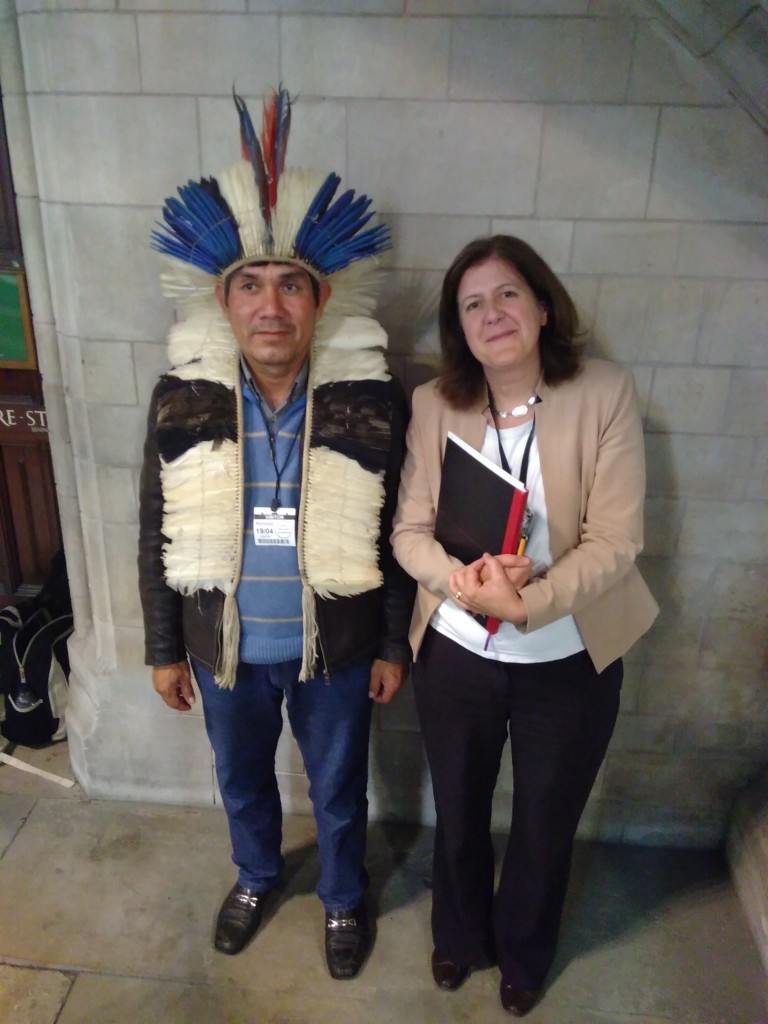The All-Party Parliamentary Human Rights Group (PHRG) met with Ladio Veron, Leader of Guarani-Kaiowa indigenous community in Brazil, on 19 April2017, to discuss the threats his community, and other indigenous groups, face there.
The main points which arose were as follows:
- Ladio Veron was chosen by members his community to travel to Europe to meet with officials and representatives of social movements to raise awareness of the plight of his community.
- He believes the Brazilian Government is committing genocide against indigenous peoples in Brazil, including the Guarani-Kaiowa indigenous community. Many indigenous peoples were attacked and killed during the two decades during which Brazil was ruled by military dictatorship. The continuing expulsion from their lands also means their slow death as a people and culture.
- The main focus of the dispute between the Brazilian Government and the indigenous peoples is land. The 1988 constitution recognises the right of indigenous peoples to live on and enjoy their lands – but this is not yet a reality and there are fears some want to change the constitution and/or the law to block this.
- The Guarani-Kaiowa are claiming only a small percentage of their traditional lands from the Government. Between 1953 and 1968 the Brazilian Government moved the Guarani-Kaiowa indigenous community into a small number of confined areas in the province of Mato Grosso do Sul. Moving to the confinements prevented the communities from continuing their traditional way of life; as a result many resisted the move, and settled instead in encampments built on the side of roads that border or cross the lands where they use to live, hoping to return to them. These people have then often been faced with repeated attempts to evict them, which often involve violence.
- The Guarani-Kaiowa indigenous community is claiming 88 areas in the province of Mato Grosso do Sul: 46 areas are being dealt with under the multi-stage Government land “recognition” process, while 42 areas have not yet been considered that process. The land being claimed would only amount to about 2% of land in the province.
- Even for land almost having successfully gone through the process, with the President having approved recognition, the communities have been unable to return, as the land has been taken over and is being used for rapid expansion of large-scale soybean and sugarcane plantations for the global ‘biofuels’ market. Commercial activity has also led to the contamination of local rivers and the destruction of ancient jungle areas.
- The Brazilian Government, as well as the Parliament, is believed to be allied with the commercial occupiers of the land, who contract private security personnel to remove indigenous peoples who live or encroach on it. Of the 594 members of Congress, 207 are believed to represent the large agricultural industry.
- There is total impunity for the killings of indigenous leaders and people: since 2010 there have been no convictions. It is believed that over 380 community leaders were killed between 2003 and 2014. Leaders and activists who stand up for their communities continue to be at considerable risk.
- The Brazilian Government has not met with Ladio Veron, however representatives from the EU and European Member States have done so, such as Spain, Greece, Italy, Germany, Switzerland, Belgium, Austria and Portugal.
- While Ladio Veron has been in Europe, his community was attacked by two helicopters believed to belong to the Brazilian military, probably in an attempt to intimidate them.
The PHRG will continue to monitor the situation in Brazil in relation to the treatment of indigenous communities, and to raise its concerns with the relevant interlocutors.


